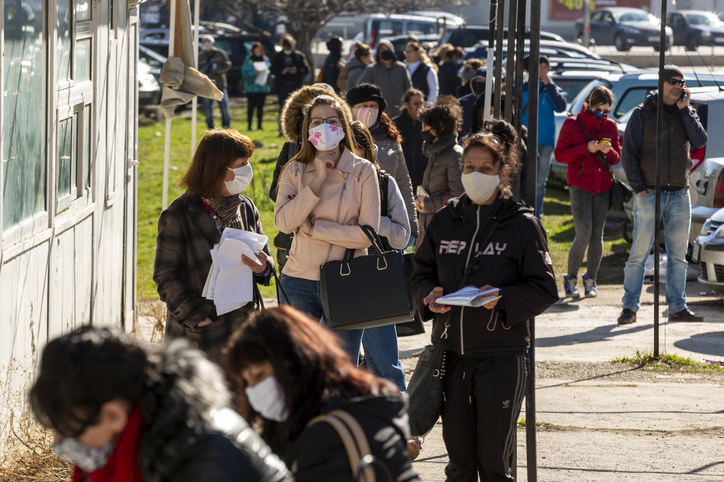The COVID-19 pandemic has ushered in the worst phase yet of capitalism in the U.S. Over 150,000 people have died and over 30 million people are out of work. Black and Latinx communities are disproportionately affected. We are caught in a perfect storm: we already have the highest numbers of uninsured and the highest rates of pre-existing conditions, increasing our vulnerability to disease and death. At the same time, we make up significant percentages of both “essential workers” and the unemployed.
As bleak as the official unemployment figures are, they give a one-dimensional understanding of the impact of the crisis on poor and working-class people. The data reflects only those who have filed for unemployment, leaving out the large numbers of people who do not know they can apply for benefits or who cannot apply because they are undocumented. These workers are asked to risk either their lives or their income. On top of that, they have to juggle child or elder care, watch their co-workers fall ill or die, and see their neighbors lose their jobs.
All the while, the government does nothing.
Amidst so much death and pain, it is both possible and essential for the labor movement to create scalable, grassroots campaigns that bring together essential workers and the unemployed. One way to do this is through decentralized organizing. The pandemic has spurred a new wave of worker organizing — much of it outside traditional unions, which only represent 11.6 percent of the U.S. workforce. Thousands of unemployed workers are connecting organically on social media. In New York, 46,000 unemployed workers have joined a Facebook group where they can connect and support each other; in California, over 51,000 unemployed workers have formed a group to help each other navigate the broken unemployment insurance system. By providing open-source infrastructure through digital tools, the labor movement has an opportunity to seize this organizing energy and support the growth and political development of workers.
We cannot revert to the shallow advocacy models of the late 1990s and early 2000s, which were focused on building bargaining containers for employers. In these models, the union became an institution to broker deals with little or no real engagement from workers. This strategy established a floor, but it cannot yield more worker wins because the workers were never at the table to begin with. This time it has to be about deep organizing — both online and offline, inside our workplaces and in our communities.
But we need to do more than just rethink how we’re organizing; we also need to expand our vision of who we organize to include both union and nonunion workers, both the employed and the unemployed. Just because workers are unemployed doesn’t mean we should stop organizing them or that they cannot exert collective power. It means that the company is no longer the only target. It means we need to organize unemployed and excluded workers together in sectoral campaigns that bring both management and government to the table.
We need to create strategic and meaningful alliances between unions, worker centers, community groups, and faith-based organizations to elevate the stories and struggles of workers — both those who have been laid off and those who continue to risk their lives. We need to build campaigns that fight for safe working conditions and dignity wages while advancing structural changes that set us up better for the next economic or health crisis. We need to organize the unemployed to fight for the kind of economy we want: one that is sustainable and centered on human needs.
There is no going back to “normal”; we need a whole new normal. We do not know yet how deep an impact COVID-19 will have on our communities. Mutual aid work and short-term policy wins are essential for meeting our communities’ basic needs. But this moment calls on us to launch big, transformational campaigns. As we fight for safe working conditions and dignity wages, we must also advance the structural changes, like a universal basic income or expanded social security, that will set us up better for the next economic or public health crisis.
If we organize for it, this could be the moment when we usher in a new society and economy built around life rather than capital.

